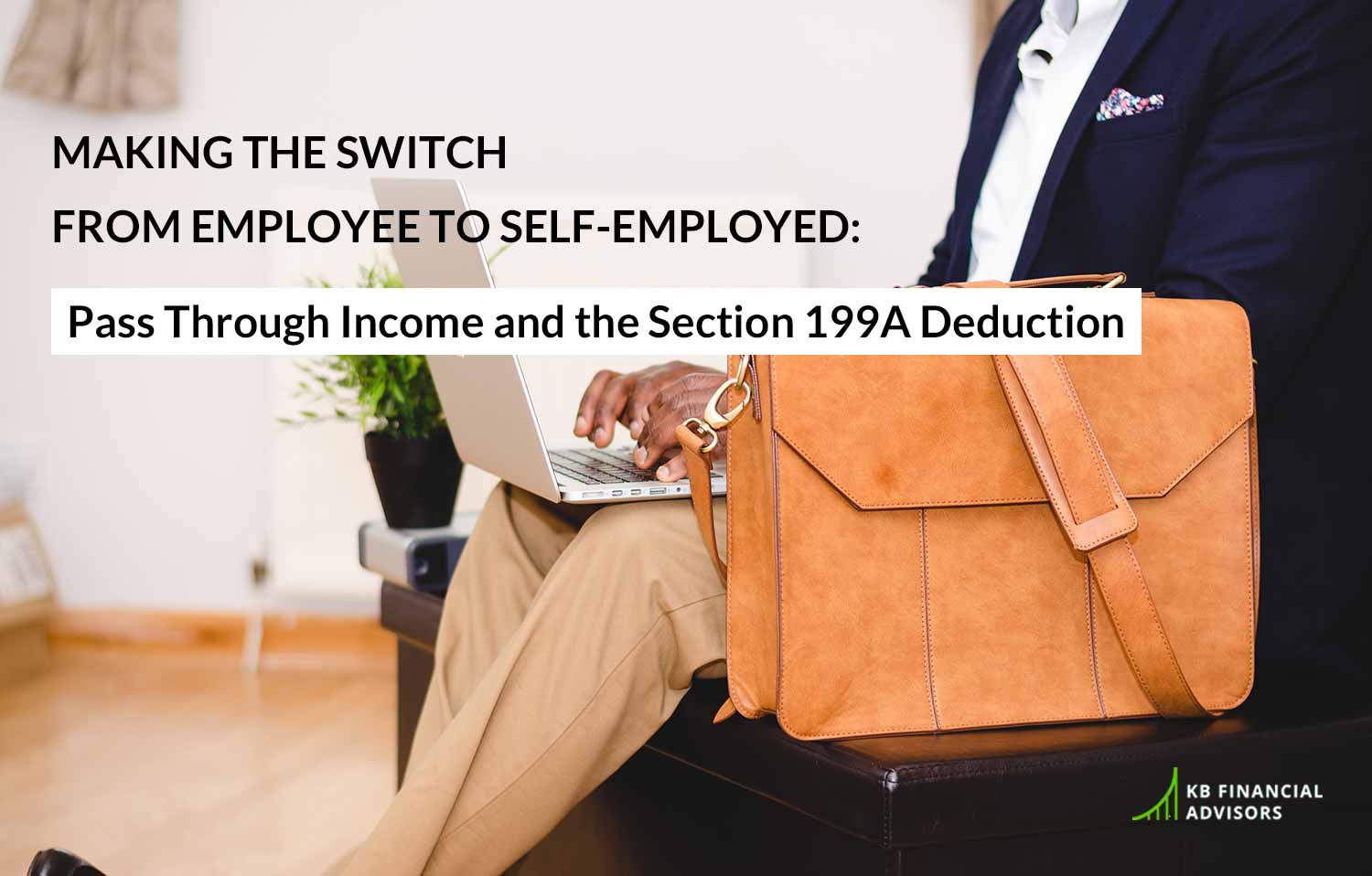Here’s what you need to know about the tax breaks for business owners and self employed persons — specifically, what you need to know about the Section 199A deduction.
Regulations issued August 8, 2018 – New regs were issued to provide guidelines and interpretations of the Sec 199A deduction. This blog has been updated to reflect these regs. A very taxpayer friendly interpretation was issued that will allow self employed persons and small businesses to take the QBI deduction as long as they do not operate in certain specified service trades or businesses (SSTB). These prohibited trades and businesses are listed below. Section 199A also says that any business where the skill and reputation of the owner or key employees is the principal asset of the business is treated as a SSTB. However, the regs clarified that this clause only applies to celebrities that license their name or are paid for personal appearances and product endorsements. Therefore, self employed IT professionals such as programmers and software engineers will be eligible to take the deduction. However, they will still have to contend with some limits to the deduction that apply over certain income levels. For higher income IT professionals, it may be beneficial to operate as an S Corp and pay yourself wages to enable you to qualify for the QBI deduction.
The regs also include an unfavorable guideline that will preclude Taxpayers from changing their status from a W2 employee to an independent contractor in order to qualify for the QBI deduction. The IRS will presume you are still a W2 employee when you switch from W2 status to independent contractor status and continue to provide the same services to your former employer.
What Is the Section 199A Deduction — and Why Should You Care as a Sole Prop?
If you receive pass through income from an S Corporation, LLC, or Partnership, you can get access to a new 20 percent deduction on “Qualified Business Income (QBI)” on your individual tax return.
The Section 199A deduction also applies to sole proprietors as well as to net income from rental operations in some circumstances.(Your investment income from dividends, interest, capital gains, however, does not qualify.)
In other words, 20 percent of your qualified business income can be tax-free. Obviously, this is a huge deduction and one that you need to know about and understand as it could make a massive impact on your bottom line when you file your 2018 tax return.
The Restrictions on These Tax Breaks for Sole Proprietors and Other Income Earners
As big of a benefit as the Section 199A deduction is, sole props and other business owners earning pass through income shouldn’t get too excited quite yet. The deduction comes with many restrictions that may limit who can access tax breaks like these.
Let’s take a look at how to get the full deduction along with a few of those restrictions to understand the limitations to the benefit.
Know that this deduction does not apply to Form W2 wage income or guaranteed payments received by partners.
If the taxable income on your individual return before the QBI deduction is less than $157,500 as a single taxpayer or $315,000 if you’re married and filing jointly, you will be eligible to take the full 20 percent Section 199A deduction.
If your taxable income exceeds this amount, however, you will be subject to restrictions or limitations on this particular tax break. That means you need to do some careful tax planning to make the most of what the IRS will give you.
If your individual taxable income is under $157,500 (assuming you’re filing single) or $315,000 (married filing jointly), your deduction is the lower of:
- 20 percent of QBI, or
- 20 percent of taxable income excluding capital gains
It may be beneficial for you to operate as an independent contractor. However, the IRS will disallow the QBI deduction if you switch from an employee to an independent contractor and provide the same services to your former employer. You may be able to refute this IRS position in rare circumstances.
No matter what, you must follow IRS guidelines around what kind of workers are eligible for independent contractor status. Not to mention, there are some drawbacks to being an independent contractor that you must consider even if the IRS would allow it.
Independent contractors must pay self employment taxes, for example, whereas employees pay only the employee portion of payroll taxes. You may also lose other employee benefits that would make such a switch unproductive for you.
What to Think About If You Currently Operate as an S Corp
If you operate as an S Corp, you must pay yourself reasonable compensation as wages. If you are the sole owner of an S Corp and want to take advantage of the section 199A deduction, you may want to consider operating as a sole proprietor instead. This strategy only works if you are under the taxable income thresholds discussed above.
In that case, all of your net income from the business could be eligible for the 20 percent deduction and you won’t need to carve out the portion reported as your wages. But remember, as stated above, there are some tradeoffs: you’ll incur self employment taxes (Social Security and Medicare) on your entire business profit.
As an S Corp, on the other hand, you only incur payroll taxes on your wage income. Your remaining profit in this case can escape self employment tax.
So which scenario is best? You should crunch the numbers to determine what tax strategy would leave you with the most profit in your pocket, because it will depend on your specific scenario and the financial situation of your business.
Don’t forget to consider more than just numbers, too: there may be legal and business reasons to operate as an S Corp rather than as a sole prop. And finally, watch out for the taxes you’ll incur if you dissolve an S Corp and transfer appreciated assets to the owners.
And if you operate as a partnership or LLC, you should consider revising your Partnership or LLC agreement to lower or eliminate “guaranteed payments” to partners.
What Happens to the Tax Break for Sole Proprietors Above the Income Limit Threshold?
The taxable income limits on the Section 199A deduction phase out between $157,500 and $207,500 (for taxpayers filing single) and $315,000 and $415,000 (for those completing a return as married filing jointly). At that point, you become subject to restrictions or limitations depending on the type of business you conduct.
Specified Service Trade or Business
If you are in a “Specified Service Trade or Business,” (SSTB) you are not eligible for the QBI deduction if your taxable income exceeds $207,500 (filing single) or $415,000 (married filing jointly). If your taxable income is between $157,000 and $207,500 (single) or $315,000 and $415,000 (married filing jointly), you are eligible for part of the QBI deduction.
The specified service businesses include companies operating in the health, law, accounting, actuarial services, performing arts, consulting, athletics, and financial services industries. Engineers and architects are exempt from this restriction.
The specified service business exclusion also applies to “any trade or business where the principal asset is the reputation or skill of the owner or one or more employees.” Prior to the proposed Regs issued August 8, 2018, it was feared thatthis might be a catch-all which would prevent many service businesses from taking the QBI deduction.However, the Regs clarified that this clause only applies in very limited circumstances.
Accordingly, self employed individuals and small firms that do not conduct a SSTB, will be eligible for the QBI deduction. The new regs also clarified that real estate and insurance brokers and agents will qualify for the QBI deduction. While consultants are not eligible for the QBI deduction, other IT professionals such as programmers and software engineers will be eligible for the QBI deduction. You need to drill down and define the exact nature of the services being provided.
Businesses Other than Specified Service Trade or Business
This category includes retailers, manufacturers, wholesalers, construction trades, or any type of business that is not considered a “Specified Service Trade or Business.”
Once you exceed the taxable income threshold limits, you do not lose the Section 199A deduction but you do become subject to a specific limitation. The deduction will be limited to 50 percent of your allocable share of wages paid by the business to all employees, including the S Corp’s owners’ salaries.
However, you can choose to use an alternative limit based on your allocable share of 25 percent of W2 wages plus 2.5 percent of your share of the cost of depreciable property used in the business. This alternate limitation could benefit real estate companies with substantial depreciable assets and small wages.
If you’re currently operating as a sole proprietor, this also means you could benefit from a tax perspective by switching to an S Corp and paying yourself a reasonable salary. This will create W2 wages to allow you to meet the limitation.
Making this switch can also save on self-employment taxes since only your wages are subject to payroll tax. If you operate as a partnership or LLC, you should consider revising your Partnership or LLC agreement to lower or eliminate “guaranteed payments” to partners.
What’s Next?
Again, there are some pieces of information we’re still waiting on — but attentive tax professionals and strategists are carefully studying the new regs and keeping an eye on further developments.
If you think you could benefit from the 20 percent income tax break, reach out to your financial and tax planner now and start making moves so you’re prepared to act appropriately to make the most of any potential 2018 tax breaks.






